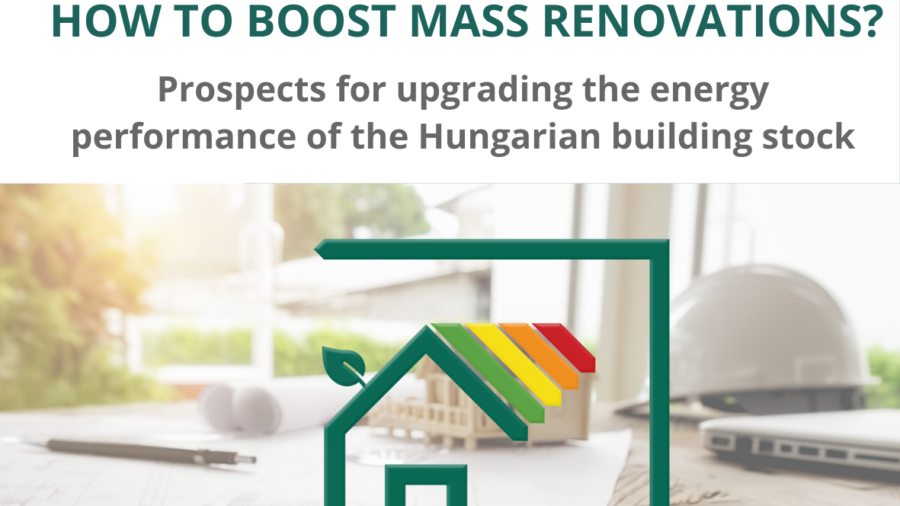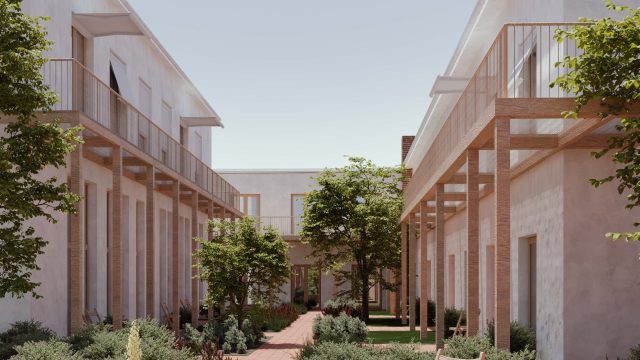Hungarian experts are setting up a one-stop shop model for renovation consultancy to enable the energy renovation of extremely outdated and energy-intensive domestic residential buildings. The conference, entitled “How to boost mass renovations? – Prospects for upgrading the energy performance of the Hungarian building stock”, looked at the challenges related to financial, technical, social and consumer attitudes facing the energy renovation of housing stock today and the solutions to overcome them.
Buildings are Hungary’s biggest energy consumers, accounting for 40 percent of domestic energy demand. Significantly reducing our energy consumption and achieving the related national and international strategic targets will not be possible without a major energy renovation of the building sector, including the largest consumer, residential buildings.
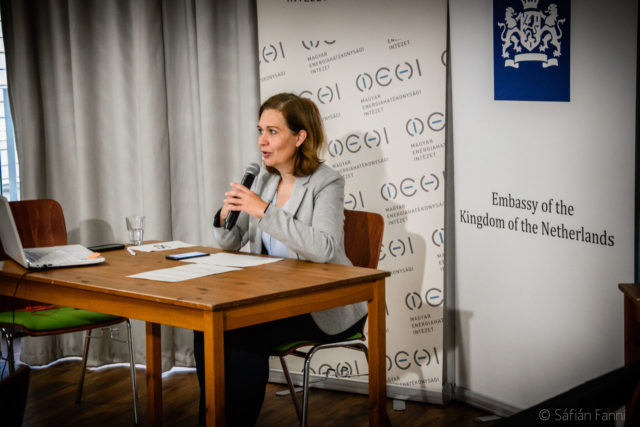
Domestic residential buildings are very outdated, with huge potential for energy savings. But renovation is a lot of work, people don’t have enough information, they copy bad examples from each other, and many end up not even thinking it’s worth renovating. This situation is helped by a new Hungarian initiative, the RenoHUb project, said Gábor Orbán, director of Energiaklub. What do we need to renovate? – The Hungarian Institute for Energy Efficiency (MEHI), in cooperation with the Embassy of the Kingdom of the Netherlands and Energy Cities, organised a professional conference on the energy condition of domestic residential buildings and the way forward on Wednesday, which was broadcast live from MagNet House. The presentations and the programme can be downloaded at the bottom of the article.
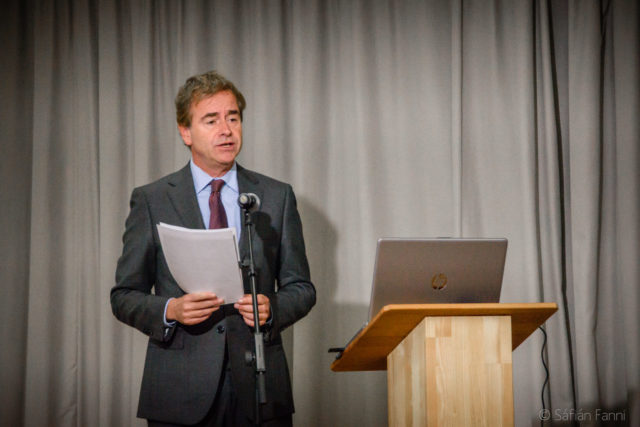
The conference was opened by René van Hell, Ambassador of the Kingdom of the Netherlands, who recalled that Hungary and the Netherlands are committed to reducing the impact of the climate crisis, and both countries are facing the challenge of reducing emissions by up to 55% by 2030. And although much has been done – for example, decisions have been taken to close coal-fired power plants and on energy efficiency in buildings – much work remains to be done. He was pleased to welcome Reimar von Meding, founder of REIMARKT and KAW (Community Architects’ Association), as a speaker at the conference and revealed that the Dutch government, in cooperation with KAW, plans to achieve a 1.5% increase in energy efficiency.
RenoHUb project will help renovators
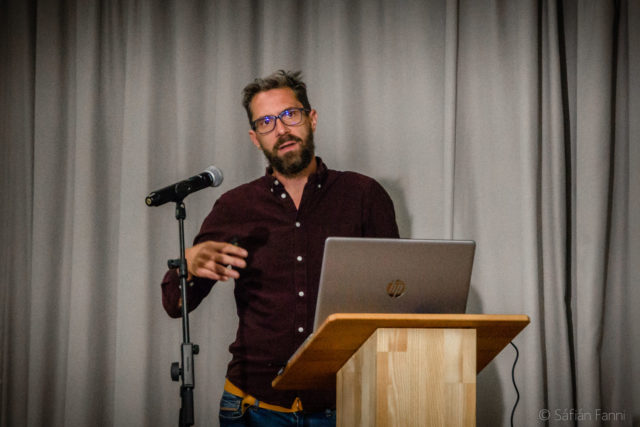
Gábor Orbán said that the RenoHUb project will introduce a successful model, the one-stop shop renovation consultancy system, which is already operating in several foreign countries, in Hungary. The long-term goal is to create a nationwide network of advisory offices and an online platform where practically all information will be available to prospective renovators. For example, the steps of a renovation, which products to choose, a savings calculator, an expert database of verified and reviewable contractors and energy experts, financial financing options.
The director of Energiaklub announced that two offices will definitely be opened next year, and they are continuously looking for potential partners for further ones, with a special emphasis on the role of banks and municipalities.
The project is being implemented by a five-member consortium of AACM Central Europe, Energiaklub Policy Institute and Methodology Centre, IMRO-DDKK Kft, Hungarian Family House Owners Association and Hungarian Energy Efficiency Institute.

The case of the shoe with laces
Reimar von Meding from the Netherlands, who has already implemented a similar model in the Netherlands, presented live at the conference. The founder of REIMARKT, CEO of KAW Architecten, spoke about how the Netherlands and Hungary are almost the same size, but whereas in the Netherlands we would need to renovate 1,000 residential buildings a day, in Hungary we would need to renovate 500 residential buildings a day to achieve climate neutrality by 2050. The one-stop shop concept of renovation consultancy offices, through which REIMARKT has already renovated 4,000 houses, is a solution to speed up renovation.
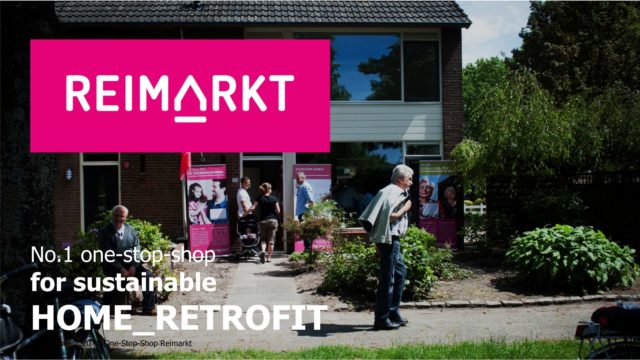
The difficult thing about renovation is that no one knows at the beginning exactly how much it will cost, when it will be finished and what the result will be – so you wouldn’t buy a loaf of bread or a pair of shoes. Especially if you find out in the process that the shoes don’t come with laces. The solution is to think with the customer’s head, and to realise that the energy renovation itself and its sustainability aspect is not attractive, it is not a sale in itself. Reimar von Meding showed how it was possible to shorten and make effective the customer relationship and the whole renovation process from advice to implementation, and how to take into account that, although you want to sell a sustainability product, you have to appeal to the emotions. For example, the fact that older people do not want to end up in a nursing home and are therefore more willing to renovate their home, and energy renovation is linked to this.
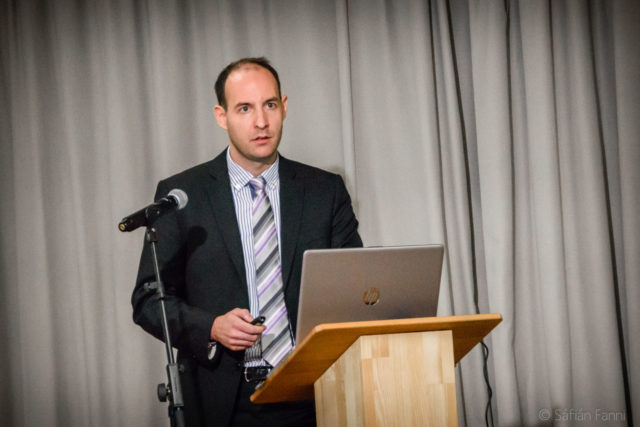
Family houses have great potential
In Hungary, small-scale renovations are common in the 2010s, but on average they result in energy savings of less than 30%. These savings cannot be clearly identified in household energy statistics at the national economy level. It seems necessary to increase the depth of renovations to ensure that they result in measurable savings, said Tamás Szórádi, senior project manager at MultiContact Consulting Kft. The energy savings are greatest in detached houses at the lowest cost. Small apartment buildings with less than 10 apartments and prefabricated houses come next. Within detached houses, however, a distinction should be made between terraced houses, which are more expensive to renovate because more expensive insulation materials can only be used for terraced walls.
Green financing
Hungary has the 7th highest household energy consumption in the EU. The Hungarian building stock is considered to be very outdated, with one of the lowest energy-efficient building stock ratios in the EU. Róbert Mátrai, Head of the Supervision Unit of the Sustainable Finance and Supervision Internal Regulation Department of the Magyar Nemzeti Bank (MNB), gave an overview of the tools banks can use in this area, including green bonds, green funds, green loans and green deposits.
Such green products are still minimal in the offer of domestic banks, and the MNB aims to stimulate this market. As a first step, from the beginning of the year, domestic credit institutions will be able to benefit from a capital requirement reduction from the MNB for loans for energy efficiency upgrades or for the purchase of housing with an energy rating of at least “BB”.
The MNB sees a steady increase in demand for energy-efficient properties because they prove to be more stable in value during economic downturns and increase in value more than the average property during economic booms. According to the MNB’s green hypothesis, energy efficiency loans are much safer – defaulting later or not at all – than other loans. This hypothesis has since been confirmed by a study based on a sample of 40,000 people, which found that non-energy efficiency loans default 2.82 times more often.
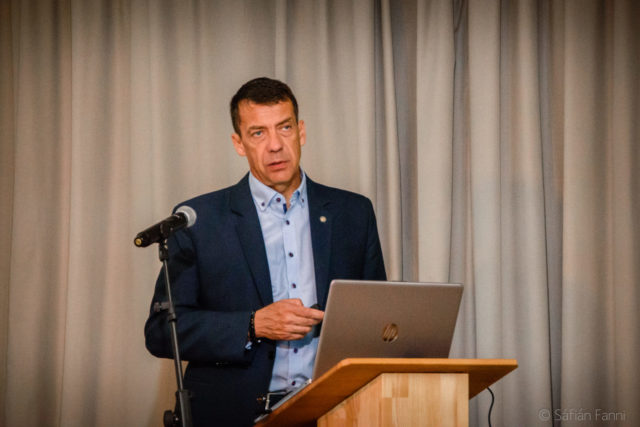
The solution: complex renovations
Tamás Versits, building services engineer and expert of Weishaupt Hőtechnika Ltd., argued in favour of complex renovations and stressed that no energy modernisation is possible without an inspection of the heat generating equipment. At the conference, he presented a case study where, after insulating a detached house, they expected to save 40 per cent of energy and the heat demand of the property had actually reduced by that much. However, when they looked at the gas bills, they found that gas consumption had actually increased, which was due to an oversized, incorrectly adjusted boiler.
He pointed out that in many older homes, where boilers were installed when gas and boilers were very cheap, they were often triple the capacity; however, this can now mean significantly higher gas consumption. Nevertheless, a boiler does not always need to be replaced: if it can modulate over the required range, if it is regularly maintained and cleaned, it can operate efficiently.
The role of the community in renovation
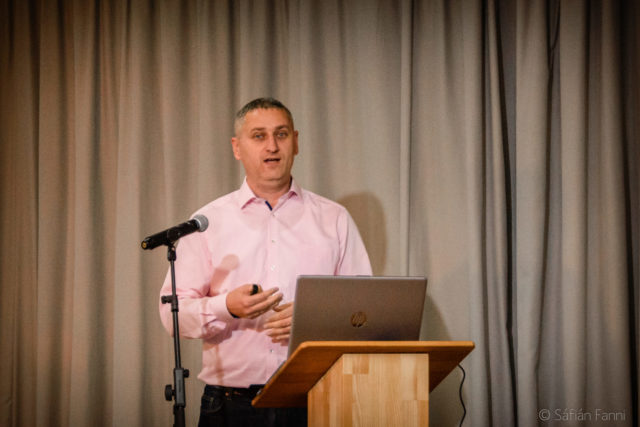
István Gulyás, the President of the Hungarian Family House Owners Association, recognizing that the owners of family houses do not have any meaningful help in planning and carrying out renovations, founded the Hungarian Family House Owners Association. Its aim is to bring together and help the 2.7 million family house owners in a completely new, innovative, grassroots way, primarily to implement energy efficiency measures.
With the help of advice available at the association and the book Green Homes for All, families can learn how energy efficiency works in practice and make their homes more efficient. But if they think they need a major energy efficiency investment, the power of community – critical mass and better advocacy – can help them get big discounts and cheaper purchase prices. And future plans may even include their own highly discounted financial services for members. The Association will start its membership recruitment process in the coming month.
Focus on local governments
The series of presentations was followed by a panel discussion jointly organized by Energy Cities and MEHI, in the framework of the Energy Efficiency Watch project, which focused on the role of local governments in energy efficiency investments, moderated by Krisztina Dely, Energy Cities’ associate
Energy Efficiency Watch feeds back the views of stakeholders and policy makers on the implementation of EU energy efficiency legislation to EU decision makers through national roundtables. Krisztina Dely, in her introduction to the panel discussion, reminded that the stakes are huge: to reach the EU’s 2030 climate target of 55 percent, the pace of building renovation needs to at least double. This would also be the biggest opportunity not only to tackle the climate crisis but also to recover from a pandemic: energy-efficient renovations create the most long-term jobs and address energy poverty much more effectively than cutting bills. Currently, 1 in 4 households in the EU are struggling to pay their energy bills and this is expected to worsen as the pandemic deepens and unemployment rises.
István Bart, Director of the Institute for Climate Strategy 2050 and member of the Energy Club Board, pointed out that the effects of greenhouse gas emissions are felt about 30 years after the emissions have occurred, so we are only feeling the effects of 1990 emission levels now. To reduce emissions we need to imagine a completely different way of life. Unfortunately, the Paris Agreements as a whole allow enough emissions that we cannot guarantee a maximum of 2°C: they are more in the direction of 3-4 degrees of warming, so they are not enough. He pointed out that the Hungarian government has opted for a comfortable, painless target in the new NEC: the 2030 targets will already be met with the planned closure of the Mátra power plant and the impact of COVID. Thus, to achieve the projected climate neutrality, we would only need to achieve a 0.5 per cent reduction in emissions per year until 2030, and 5 per cent per year between 2030 and 2050, which means a shift of the tasks to the years after 2030. In Bart’s view, this has turned non-climate policy in our country into climate policy in disguise.
Ada Ámon of the Budapest Capital pointed out that domestic emissions have been rising sharply since 2014, a trend that could have been halted. It is important to see that two thirds of energy consumption in the capital is linked to buildings, and 40 percent of it is used in residential buildings alone, very poorly. But this is also where the city’s greatest potential for emissions reduction lies. According to the results of the Capital’s resident survey, half of Budapest residents would only embark on an energy efficiency project in their property if they received significant state or municipal support, so resolving the issue of financing is now the top priority. At the same time, the first Budapest Climate Community Survey ranked the problem of energy efficiency in buildings as the most serious of all.
Gyula Nagy, President of the Hungarian Chamber of Engineers (MMK), said that MMK has taken over the task of helping the renovation of residential buildings through the National Energy Efficiency Network from government agencies this year. This will give them two important tasks: providing advice and ensuring traceability. Back-up teams are now being set up and work has begun to set up advice points where residential and business customers will be able to receive free advice.
Sándor Szabó from the Municipality of Budaörs took stock of the wide range of emission reduction plans, climate plans and projects that Budaörs is trying to implement in order to achieve climate neutrality. They joined the European Covenant of Mayors back in 2011, and by 2016 they had already achieved 15 percent of their 20 percent emissions reduction target. They will provide up to 1 million forints to support renovators and plan to open an energy efficiency advisory office. To achieve energy efficiency targets, the Build Upon2 project is also working with other municipalities to increase the number of renovations by setting up a tiered building renovation framework.
Katalin Hall of BORA 94 Borsod-Abaúj-Zemplén County Development Agency Nonprofit Ltd. presented an exciting 5-year REBUS project aimed at improving policies on energy efficiency renovation in public buildings. This included an energy efficiency renovation roadmap with tips and recommendations for municipalities on what to look out for during renovation, and a collection of 12 international good practices covering the whole renovation process: planning, implementation/execution, monitoring and capacity building. The Hungarian good practice, which included energy training for municipal employees in Rácalmás, was identified in the latter area.
Miskolc has been committed to smart and green city initiatives since 2010. The biggest achievement so far has been the PPP initiative between Miskolc and Pannergy, which since 2013 has seen the district heating system of the Avas housing estate run more than 50 percent on geothermal energy. In the last few years, 23 public buildings (schools, kindergartens) have been renovated, with energy savings of up to 70 percent.

